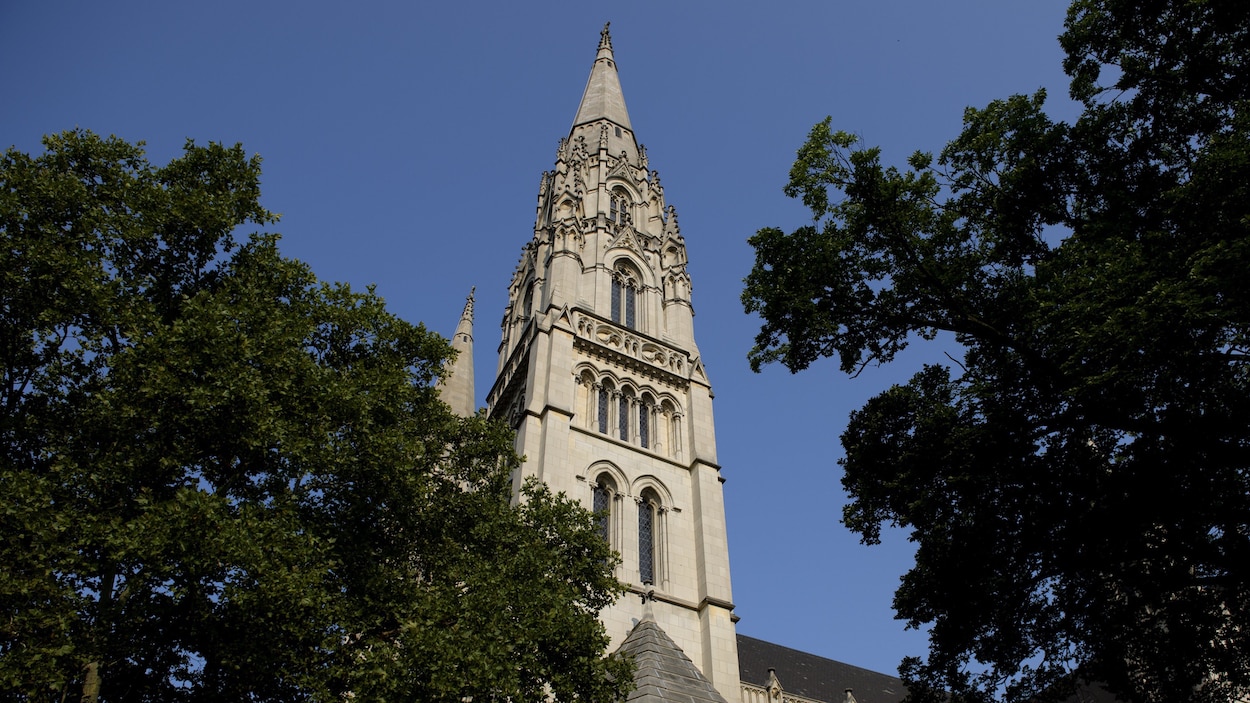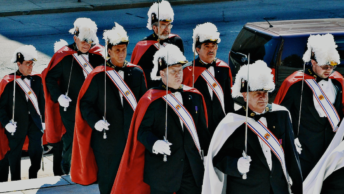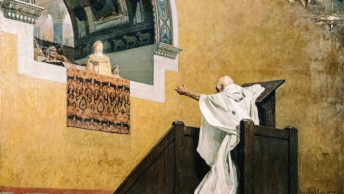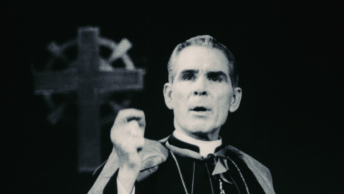For over a century, Hollywood has served as the showcase for American culture. For generations, patriotism, hard work, fair play, and even religious fervor permeated the big screen because it was good business to give the public what it wanted. Whether a glamorous Broadway opening or in the weekend movie house in thousands of hamlets across America, Hollywood promoted the hopes and dreams of millions of Americans. It was the guardian of American culture. That is no longer true.
Hollywood has become an avatar of cultural change, a far cry from its traditional role of providing family entertainment. According to his book, Hollywood vs. America: Popular Culture and the War on Traditional Values, film critic Michael Medved attributes this dramatic change to the 1960s invasion of a Marxist Ivy League elite.
As a whole the entertainment industry no longer reflects the religious, patriotic and political views of the American people. Hollywood has been dominated by a cynical, nihilistic cultural elite who despises religion in general and the Catholic Church in particular for its long opposition to the secular virtues of fornication, adultery, divorce, abortion, and homosexuality.
Echoing cultural Marxist Antonio Gramsci’s long march through the culture, it has employed its big screen in its relentless pursuit of a sociological experiment, designed to change the very fabric of American cultural life. Hollywood’s disdain for religious truth and family values prompted the studios to create its own Gospel of Truth. The transition was quick. In 1965, the Best Picture went to the lyrical The Sound of Music. Four years later Midnight Cowboy, a bawdy tale of a male hustler in New York City became the only X-rated film to win the award.
This new trend started near the end of the 1960s when Hollywood replaced the declining star system that gave the world Bogart, Stewart, Cagey and Wayne with an inexhaustible supply of car chases, sexual perversions, violent shoot-outs, and profanity that painted America as a self-loathsome place. Patriotic films, such as Sergeant York, Mr. Smith Goes to Washington and It’s a Wonderful Life have given way to Scarface, Show Girls, and Natural Born Killers. Critics of the Hollywood Gospel are quick to point out that the R Rated movie with its disturbing combination of sex, violence, and blatant disregard for human life, seldom makes money at the American box office.
Paradoxically, Hollywood’s studio executives seem to have placed ideology over finance. But these critics are missing the point that the global public loves anything that undermines American power and influence. According to Medved in 1970 more than 70% of Hollywood’s revenue for the major studios came from the United States. This has declined to less than 30%. It all makes perfect sense when one realizes that Hollywood relies on marketing its movies and DVDs to an ideological-driven world, with an ambivalent need for American culture, especially movies that portray American life in a critical light. To the delight of dictators and terrorists around the world, Hollywood’s constant emphasis on the dysfunctional nature of American life has misled the world as to the extent of the degeneracy and evil of the American people.
Several Hollywood stars have taken turns leading the pack in promoting the Hollywood Gospel. Few have the credentials that Sean Penn has amassed through his career. A star since his debut as the foul-mouthed, drug-ingesting teenager of Fast Times at Ridgemont High (1982), Penn has metamorphosed into an investigative reporter of his emotional life and our world. He has made several trips as a reporter to the Middle East to Iraq, Jordan, and Iran in the last four years. According to New Yorker Magazine, Penn is a roiling combination of rage, buoyancy, tenderness, and hurt. Most of his characters, in films such as The Assassination of Richard Nixon, Casualties of War and Mystic River are angry, violent, and prone to self-destruction.
It appears that his alcoholic mother, actress Eileen Ryan and blacklisted actor/director Leo Penn inspired his iconoclastic fury against the real world. While the elder Penn was not named in the House Un-American Activities Committee (HUAC) investigations, his refusal to testify earned him a fellow-traveler label and virtually ended his career.
With such parents, it is not surprising that Penn has established himself on the world stage as a sort of one-man Citizen Watch. At the 1991 Cannes Film festival Penn spoke of the great rage in this country because its people relished fear-based religion, corrupt government and an entire white population, living on stolen property they murdered for and that is passed on from generation to generation. Like Jane Fonda, Tim Robbins, and Susan Sarandon before him, Penn is a leftist icon who preaches the Hollywood Gospel.
As if in the vortex of a Marxist triangle, more dangerous than anything this side of Bermuda, Hollywood’s elite has slated the major pillars of American society for complete destruction. Tinseltown once revered strong families and well-adjusted children, whose love for their parents and a pet or two exuded a uniquely American quality. Its films usually praised the American family for instilling the civic virtues of hard work, self-discipline, respect for others, politeness and patriotism.
In today’s Hollywood movies dish out an unhealthy diet of violence, sexual experimentation, and disrespect for all authority, and anti-religious bigotry—all which serve to undermine the moral and sociological importance of the family. According to the Hollywood Gospel, the one-size family does not fit all. The designer family must come in all shapes, sizes, arrangements, and tastes.
Most prevailing impressions, dramatized in the movies include the belief that religion is for weak-minded people. Love is never saying no to any desire and morality comes from the emotions. According to its Gospel, America is an evil empire of greedy white males who have oppressed minorities, women, and homosexuals. The colonists were environmental rapists (Pocahontas). Insensitive louts won the West (Dances with Wolves) by oppressing native Americans and slaughtering their food supply. White racism was pervasive in Mississippi Burning, and A Time to Kill.
The United States military is often viewed as a malignant force that is forcing its will on a defenseless world. The FBI, the CIA and religious conservatives alternate as the evildoers in American political life. In The Contender, an evil conservative plots maliciously to keep a liberal woman from becoming the country’s vice-president. In a Few Good Men, the Marine Corps is disgraced by the prejudices of one of its veterans.
Several years ago, Harvard University’s Arthur Schlesinger said that anti-Catholicism was as American as apple pie. In his 2004 book, The New Anti-Catholicism, religion professor, Philip Jenkins writes, what sometimes seems to be limitless social tolerance in modern America has strict limits where the Catholic Church is concerned. This new wave of anti-Catholicism is no longer based on the know-nothing, nativist, and xenophobic fear. It has taken on a more subtle appearance.
The Catholic Church used to be a moral guardian to be reckoned with. For generations it published the Legion of Decency Code that kept Hollywood on its toes. After the election of President John F. Kennedy in 1960, Catholics looked less to their Church for guidance in entertainment and sexual matters. Consequently, the Code did not have as much influence and the Church effectively lost much of its moral leverage.
Despite its relative loss of influence, the Church has been a constant in Hollywood’s crosshairs. As a result it is not surprising that Hollywood has played a leading role in this new kind of anti-Catholic bigotry. Its Marxist-oriented elite is not interested in the theological debates that fomented the Protestant Revolution of the 16th and 17th centuries. Hollywood’s attack on the Church stems from a modernist mindset that condemns any institution that opposes its secular gospel. Its pictures have persistently targeted the Church for its failure to accept the liberal worldview at the core of its progressive approach to making films.
It thinks more in terms of sociological issues, such as population control, homosexual unions, and women priests. Tinseltown will use whatever means necessary to force the Church from the public marketplace of ideas. While Evangelical Christians get this same treatment, Hollywood has an easy time in portraying the mainline Protestant denominations that offer little or no resistance to its pagan crusade to unseat Catholicism from its exalted position.
The public is the ultimate loser in this ideological struggle. The Movie Theater has lost much of its entertainment value and now serves as another battleground in the culture war. Gone are the merry days of the Irish banter between Catholic priests, Barry Fitzgerald, and Bing Crosby in Going My Way, the obvious religious warmth of The Bells of St. Mary’s and director John Ford’s legion of honorable and heroic priests.
While attempting to save America from the tyranny of its religious past, Hollywood has fallen into the pond of its own narcissistic reflection. It has succeeded in creating an alternate reality that has nearly obliterated real life and real people. This was best illustrated during its 2006 Academy Award presentations. Hollywood’s theme for its 2006 awards revolved around what can only be called boilerplate homosexual propaganda.
According to the Hollywood Gospel, love is too broad to be confined to one marital union and to one gender. As a class, actors, who played homosexuals or transgendered people, dominated the nominations. Their frequency added to the Left Coast’s illusion that homosexuality was normal.
Jami Bernard of New York’s Daily News loved Brokeback Mountain, the highly touted story about two cowboys in love because the characters dared to experience the love that dare not speak its name, echoing the tormented thoughts of Irish homosexual writer, Oscar Wilde. True to the Hollywood Gospel, Director Ang Lee, who garnered the Academy Award for this movie, portrayed their perverse form of male bonding as being far more satisfying than their respective marriages. Today movies abound that highlight and sanitize every imaginable perversive relationship…except bestiality. I cannot wait for that taboo to be shattered in years to come.
The use of the cowboy genre was an important step for Hollywood. Had the movie been about two hairdressers or florists, there would have been little or no fuss. Young virile cowboys have been an integral part of the sacred fabric of American society. Despite all of the pre-award hype Brokeback Mountain received, the Academy could not pull the trigger and voted the racially charged Crash as Best Picture. As a form of penitential consolation, it cited Philip Seymour Hoffman as Best Actor for his one-dimensional portrayal of the late homosexual writer, Truman Capote.
On the political front, Hollywood has always shown a spontaneous revulsion for the late Senator Joseph McCarthy. In movie after movie, especially its two rendition’s The Manchurian Candidate, based on notorious McCarthyphobe, Richard Condon’s book, they offered a sordid caricature of his fading memory. The 2005 film about Edward R. Murrow, Good Night and Good Luck, is a highly overrated film that returned to that same tired ground.
With Murrow as its unflappable and driven hero, the movie savages McCarthy with a virulence that should have been reserved for the real enemies of state. While denouncing the Catholic Senator for his methods, true to Hollywood Marxist form, Murrow never considered the truth or accuracy of his charges.
Directed by George Clooney, an actor who may be the successor to Citizen Penn, Good Night…won the Academy Award, the movie is a black and white ode to liberal self-righteousness. Murrow cornered the market on smugness with his skillful editing of film clips that tied the phlegmatic and over-stressed McCarthy up in cinematic montage of embarrassing gestures, poses, and slurred speech on national television.
The Hollywood Gospel is pervasive. It has entered all aspects of American life with its subtle poisonous visual pills. Mark Twain commented that everybody talked about the weather but never did any thing about it. This is a defeatist attitude betraying the sense of moral apathy that is itself a by-product of the attack on American culture. Americans have to stop resting on the pillow of indifference and become aware of the moral storms around them. It has been a man-made storm and can be changed, altered and even overturned by other men and women. Moviegoers must learn to watch between the lines for every movie they see and read accurate reviews before they attend.
For Catholics the task is daunting. Millions of Catholics unwittingly attend these movies that skewer their faith and mock the nation’s traditional virtues that have allowed them to live in freedom. So hungry for entertainment, many of them check their Catholic principles at the box office. They fail to recognize is that the Catholic Church is what Pope Benedict XVI called the citadel of truth, and that it has the responsibility to protect its faithful from the errors of secular society. In many ways it is the Last Centurion, against a culture that is waist-deep in the moral waste of the Hollywood Gospel.








